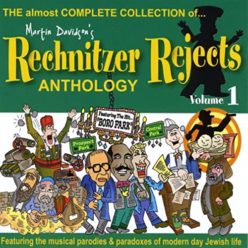A fitting time to remember all the times he made us laugh or helped us feel connected

When you need a suit cleaned in a hurry, you go look for a one-hour cleaner. If you need pictures developed right away, you go to the store that does prints while you wait. But what if you need lyrics in a hurry? Who do you call? Everyone in the music business knew the answer: Seymour Rockoff a”h.
We knew we could rely on his quick wit, his extensive Torah knowledge, and his selfless ahavas Yisrael. Although many of you may not have heard of Seymour, the chazzan of Kesher Israel Synagogue in Harrisburg, PA, he wrote and composed hundreds of songs, lyrics and most famously, parodies. He composed such ’70s-era classics as “Shabechi Yerushalayim,” “Ufduyei Hashem Yeshuvun,” and “Od Avinu, Od Avinu, Od Avinu Chai.” And on the parody front, who can forget the Rechnitzer Rejects albums, which included his famous “Boro Park” (to the tune of “New York, New York”), “Cold Chopped Liver” (to “Old Man River”), or “Learning How to Lein” (to “Singing in the Rain”)? There wasn’t a parody he couldn’t conquer, and certainly not at the speed he would guarantee to have it done. I remember how many times I’d call him up either for a parody or for lyrics and I’d say, “I hate to put pressure on you but is there any way I could have it by tomorrow?” And he always gave me the same response: “Tomorrow, I don’t know. But today, for sure.”
This week, on 21 Tammuz, is Eliyahu Shalom (Seymour) Rockoff’s sixth yahrtzeit, and it’s a fitting time to remember all the times he made us laugh or helped us feel connected.
When Seymour was a young child, he would travel every day by train from Washington Heights to Yeshivah Torah Vodaath in Williamsburg. When he got there the first day, he met Sherwood Goffin a”h, who became his lifelong friend. Both of them loved music, loved learning Torah, and were both super passionate about using correct dikduk during davening and recordings.
While “Am Yisrael Chai” is undoubtedly Seymour’s most famous composition, my personal favorite is his “The Day Will Come,” written as a dedication to Soviet Jews behind the Iron Curtain: “Each day she takes her tattered Tehillim to the cellar and there in silence she whispers to Hashem; although her neighbors know she’s Jewish, she cannot be a Jew in front of them; she lights the Shabbos candles in secret and makes a brachah no one else can hear, and she will continue to do those precious mitzvos till the day she can do them without fear….”
His mind was always churning out music and lyrics. Yisroel Lamm told me that when Seymour was learning in Williamsburg, many times he would ring the bell of the Lamms’ house, walk in, go straight over to the piano, and play a song that he had just composed. Although he wouldn’t stay long, Yisroel always treasured those moments.
In 1973, Seymour put out an album called Der Moled Vet Zein, with the title track a funny song about how the gabbai in shul would announce when the Moled would be.
His good friend Martin Davidson, who was the producer of the Rechnitzer Rejects, told me that the two of them would often go places to perform — where they would randomly stop people in any town they happened to be at the time, and ask for directions to the Rechnitzer Rebbe’s house.
Seymour was always upbeat, positive, and had a great sense of humor that he used to cheer people up. But there was one exception: The moment he walked into shul, all jokes were put aside. He considered davening to be a responsibility and not something to be trifled with. He was a chazzan for close to 30 years at Kesher Israel in Harrisburg, and earlier served in Pittsburgh and in Long Branch, NJ, before moving to Israel where he davened for the amud at Jerusalem’s Yeshurun Synagogue. People would rave about his beautiful Rosh Hashanah and Yom Kippur davening, but to him, it was anything but a performance. It was his purpose to bring people closer to Hashem through tefillah.
There’s a plaque hanging in Kesher Israel with a picture of Seymour and the words of the Gemara in Sanhedrin: “He who sings Hashem’s praises in This World, will merit singing them in the World to Come.”
Thank you, Seymour, for keeping us laughing and focused at the same time.
(Originally featured in Mishpacha, Issue 867)




